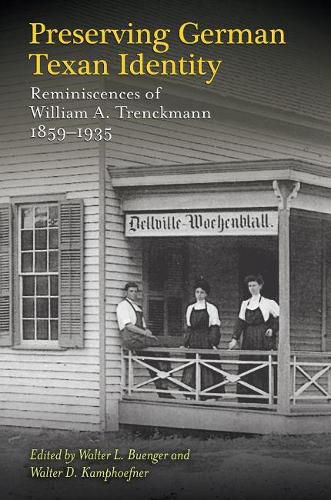Readings Newsletter
Become a Readings Member to make your shopping experience even easier.
Sign in or sign up for free!
You’re not far away from qualifying for FREE standard shipping within Australia
You’ve qualified for FREE standard shipping within Australia
The cart is loading…






This title is printed to order. This book may have been self-published. If so, we cannot guarantee the quality of the content. In the main most books will have gone through the editing process however some may not. We therefore suggest that you be aware of this before ordering this book. If in doubt check either the author or publisher’s details as we are unable to accept any returns unless they are faulty. Please contact us if you have any questions.
Born in Millheim, Texas, to a family of German immigrants who moved to Texas in the wake of the 1848 revolution, William Andreas Trenckmann was a teacher, journalist, and publisher who successfully combined his German heritage with a new, distinctly Texan identity. His education was cultivated at the brand new Agricultural and Mechanical College of Texas, where he distinguished himself as the valedictorian of the first graduating class; he later served on the college’s board of directors and was even offered the presidency. From 1907 to 1909, he represented Austin County in the Texas legislature. Trenckmann’s lasting contribution to Texas history, however, was the creation of Das Wochenblatt, a German-language weekly newspaper that he edited and published for over forty years.
Das Wochenblatt became a popular and respected source of information for German-speaking immigrants, their descendants, and the Texas communities where they lived and worked. Through the paper, Trenckmann advocated for civil liberties and free elections. He also vigorously opposed prohibition, the Ku Klux Klan, and later the rise of Adolf Hitler and National Socialism. When the United States entered World War I, many German-language publications were suspended or otherwise heavily censored, but Trenckmann’s newspaper was granted a rare exemption from the wartime government.
From 1931 to 1933, Trenckmann serialized his memoirs, Erlebtes und Beobachtetes, or experiences and observations. In Preserving German Texan Identity, historians Walter L. Buenger and Walter D. Kamphoefner present a revised and annotated translation of those memoirs as a revealing window into the lives of German Texans in the late nineteenth and early twentieth centuries.
$9.00 standard shipping within Australia
FREE standard shipping within Australia for orders over $100.00
Express & International shipping calculated at checkout
This title is printed to order. This book may have been self-published. If so, we cannot guarantee the quality of the content. In the main most books will have gone through the editing process however some may not. We therefore suggest that you be aware of this before ordering this book. If in doubt check either the author or publisher’s details as we are unable to accept any returns unless they are faulty. Please contact us if you have any questions.
Born in Millheim, Texas, to a family of German immigrants who moved to Texas in the wake of the 1848 revolution, William Andreas Trenckmann was a teacher, journalist, and publisher who successfully combined his German heritage with a new, distinctly Texan identity. His education was cultivated at the brand new Agricultural and Mechanical College of Texas, where he distinguished himself as the valedictorian of the first graduating class; he later served on the college’s board of directors and was even offered the presidency. From 1907 to 1909, he represented Austin County in the Texas legislature. Trenckmann’s lasting contribution to Texas history, however, was the creation of Das Wochenblatt, a German-language weekly newspaper that he edited and published for over forty years.
Das Wochenblatt became a popular and respected source of information for German-speaking immigrants, their descendants, and the Texas communities where they lived and worked. Through the paper, Trenckmann advocated for civil liberties and free elections. He also vigorously opposed prohibition, the Ku Klux Klan, and later the rise of Adolf Hitler and National Socialism. When the United States entered World War I, many German-language publications were suspended or otherwise heavily censored, but Trenckmann’s newspaper was granted a rare exemption from the wartime government.
From 1931 to 1933, Trenckmann serialized his memoirs, Erlebtes und Beobachtetes, or experiences and observations. In Preserving German Texan Identity, historians Walter L. Buenger and Walter D. Kamphoefner present a revised and annotated translation of those memoirs as a revealing window into the lives of German Texans in the late nineteenth and early twentieth centuries.